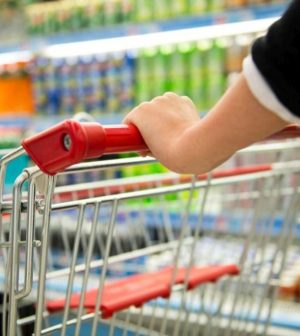- 10 Strategies to Overcome Insomnia
- Could Artificial Sweeteners Be Aging the Brain Faster?
- Techniques for Soothing Your Nervous System
- Does the Water in Your House Smell Funny? Here’s Why
- Can a Daily Dose of Apple Cider Vinegar Actually Aid Weight Loss?
- 6 Health Beverages That Can Actually Spike Your Blood Sugar
- Treatment Options for Social Anxiety Disorder
- Understanding the Connection Between Anxiety and Depression
- How Daily Prunes Can Influence Cholesterol and Inflammation
- When to Take B12 for Better Absorption and Energy
Risk of COVID from Grocery Store Surfaces Very Low: Study

TUESDAY, Oct. 12, 2021 (HealthDay News) – Your chances of getting COVID-19 from surfaces at the grocery store are minimal, a Canadian study reassures.
Researchers at the University of Guelph in Ontario collected 957 samples at four grocery stories over a month. None tested positive for SARS-CoV-2, the virus that causes COVID, the study found.
In other words, high-touch surfaces like the handle of your shopping cart or the freezer door should be safe to touch in stores that follow good cleaning protocols.
“We believe that cleaning and disinfecting contact surfaces along with wearing masks significantly minimize the risk of transmission from surfaces in grocery stores to humans,” said Dr. Maria Corradini, an associate professor of food sciences.
Research early in the pandemic suggested the virus could survive on surfaces for hours or even days, leading many folks to wear gloves while shopping.
For this study, researchers swabbed not only the handles of grocery carts and baskets, but also payment terminals, conveyor belts at checkouts, the surfaces around deli counters and the plastic and metal handles in frozen food sections.
Then they did PCR (polymerase chain reaction) testing to look for the virus’ RNA.
It didn’t matter what time of day they tested or whether the store was in a city or a suburb, none of the samples tested positive for the virus.
“These results suggest that if stores enforce regular sanitizing routines and monitor the health of store personnel, the risk of exposure from high-touch surfaces within a grocery store is low,” Corradini said in a university news release.
The authors said their findings support those of the U.S. Centers of Disease Control and Prevention. The CDC found that while transmission of COVID-19 through surfaces is feasible, it is unlikely because the virus is typically spread through droplets or airborne transmission from infected people.
The study was recently published in the journal Current Research in Food Science.
More information
The Centers for Disease Control and Prevention has more on COVID-19 and surfaces.
SOURCE: University of Guelph, news release, Oct. 5, 2021
Source: HealthDay
Copyright © 2026 HealthDay. All rights reserved.










